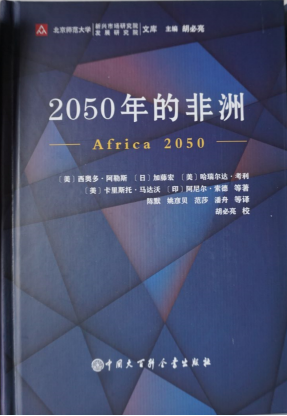
Africa has come a long way in the past two decades, economic growth is accelerating, societies are stabilizing, andincreasing number of people are starting to lift themselves out of poverty. However, Africa still needs to address many serious challenges, such as education, health, employment, and the environment in order to achieve long-term, sustainable and inclusive growth. African leaders should realize that a little carelessness could wipe out Africa's achievements of the past two decades and return to war and poverty. Africa has a long way to go to catch up with the rest of the world. By Theodore Ahlers, Callisto Madavo, USA Co-authored with Harinder Kohli, Japanese Hiroshi Kato , and India's Anil Sood; Co-translated by Hu Biliang,the chief eidtor, Chen Mo, Yao Yanbei, Fan Sha, and Pan Zhou, "Africa in 2050 (fine) / Emerging Markets Institute, Beijing Normal University" predicts that by 2050, Africa's per capita income will reach the current level of moderately developed countries. The gap between political development and developed countries will narrow. Africa's strength lies in its rich natural resources and its young demographic structure: Africa's natural resources and human resources are likely to play an important role in the world economy, given the increasingly depleted resources in other regions and the growing problem of population ageing. However, natural resources and population resources are both advantages and problems. The book explores from multiple perspectives how Africa should use its strengths to catch up with the possibilities and necessary policy changes of the fast regions of the world in the coming decades.
Author: Theodore Ahlers, Callisto Madavo,Harinder Kohli, Hiroshi Kato , Anil Sood
Editor: Hu Biliang
Translated by: Chen Mo, Yao Yanbei, Fan Sha, and Pan Zhou